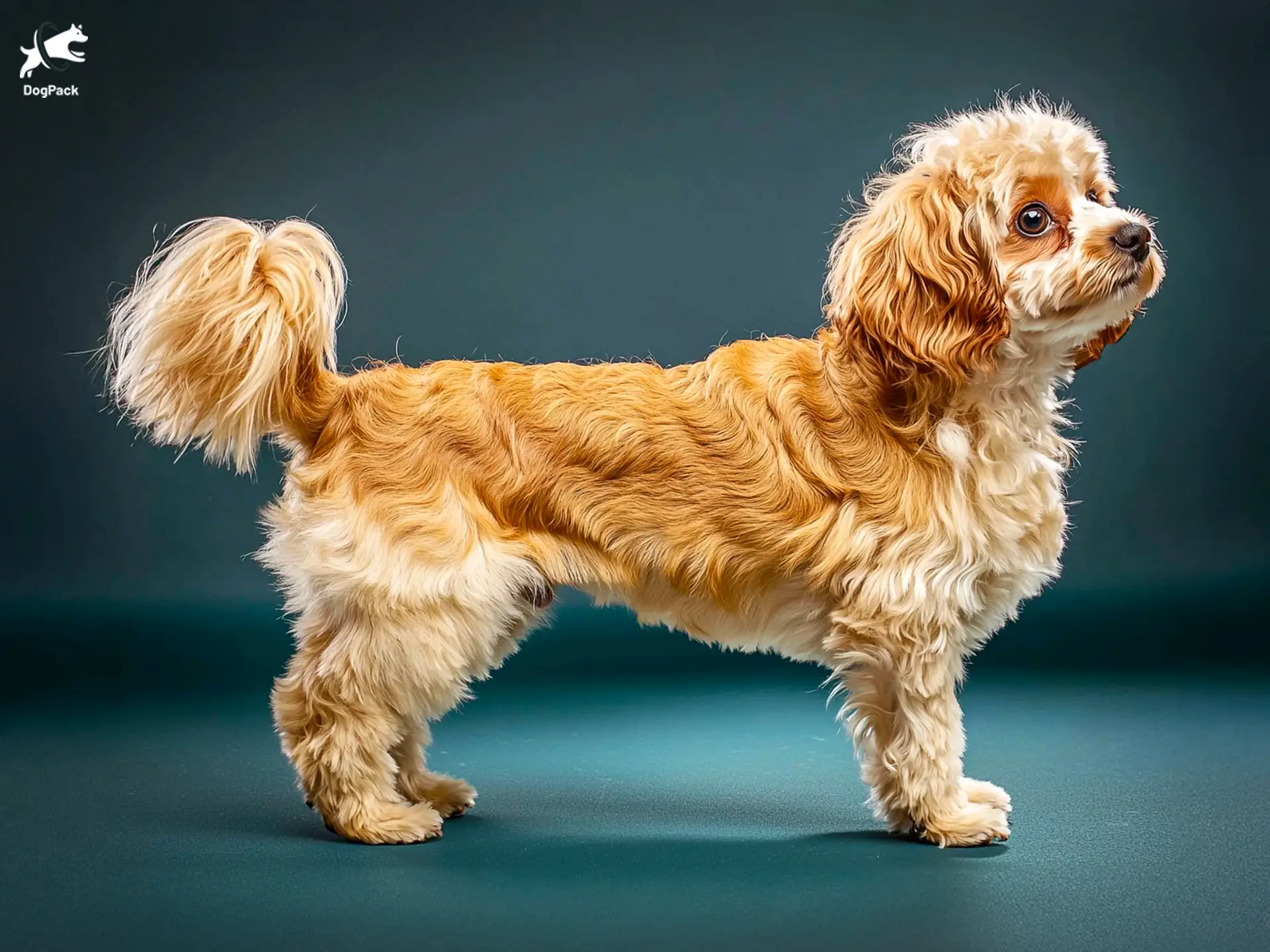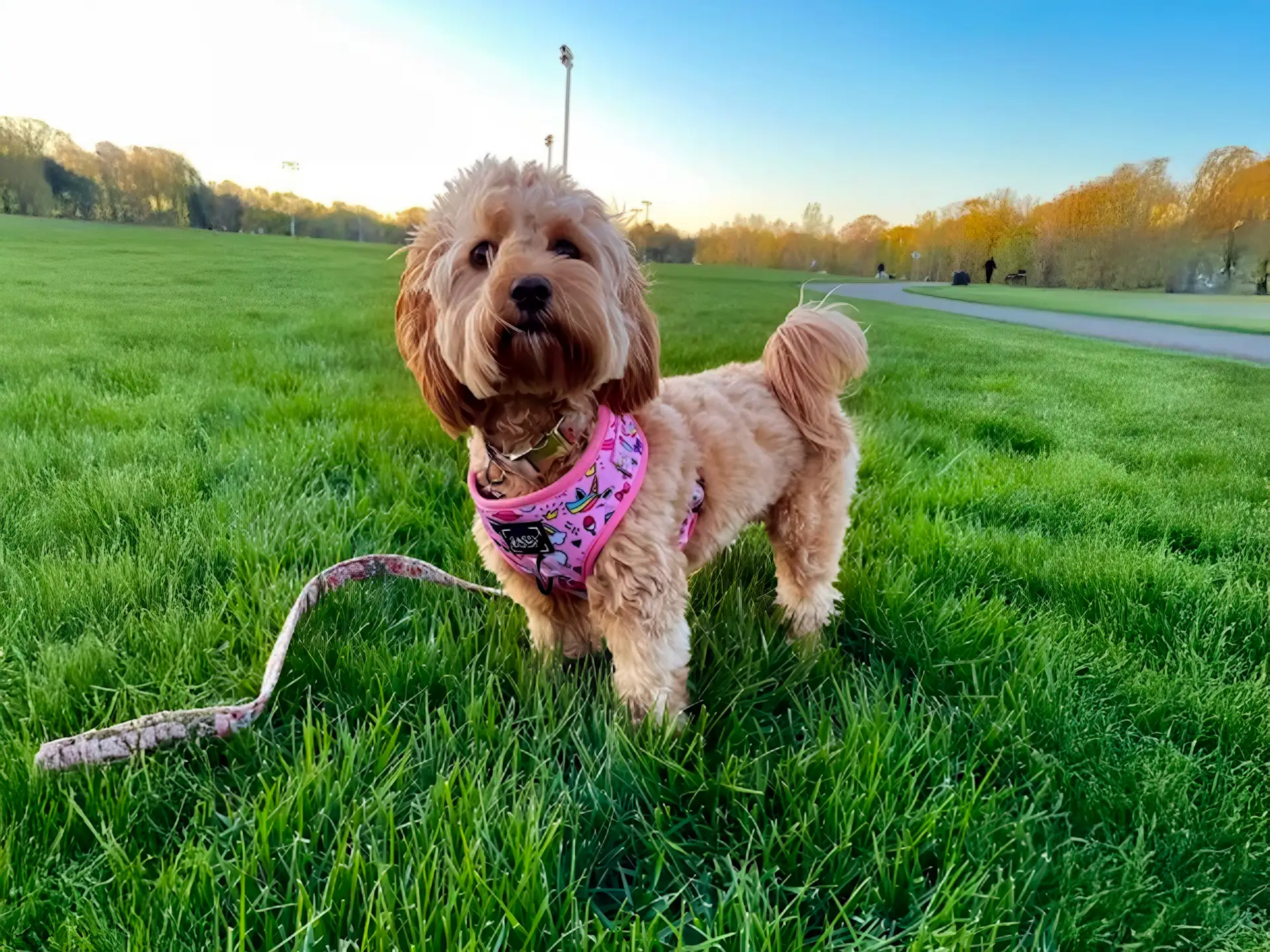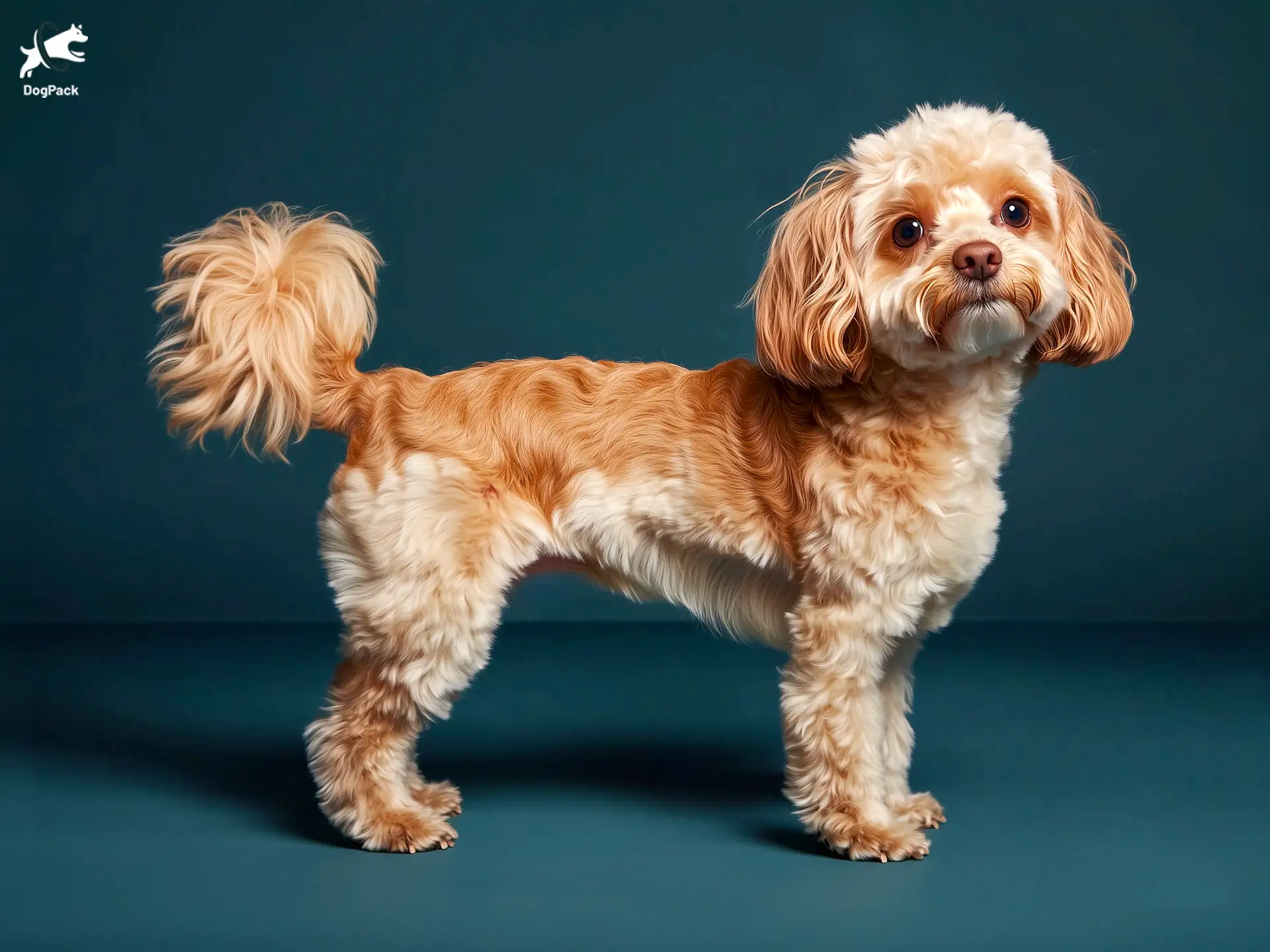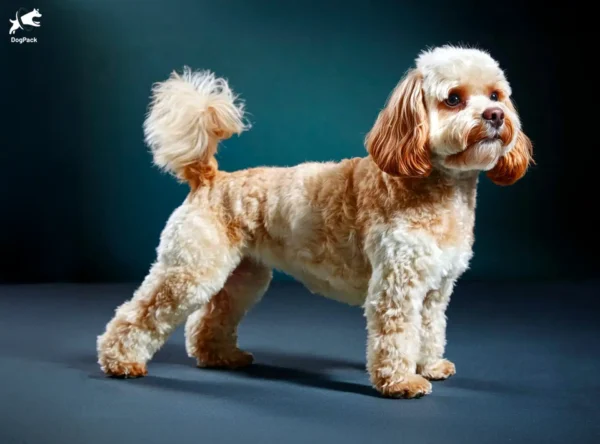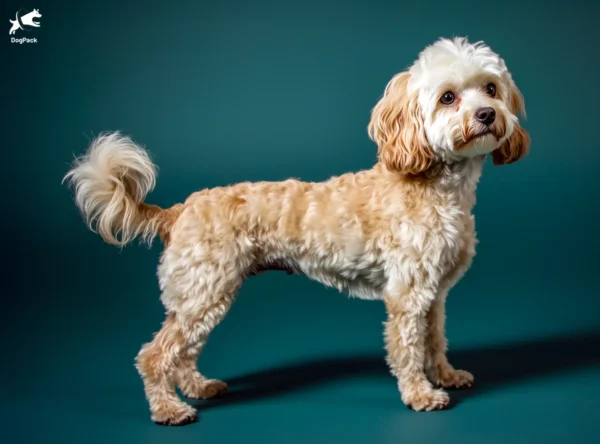Cavapoo (Cavoodle) Dog Breed Info & Overview
Ever wondered what you’d get if you mixed a teddy bear with a genius? Meet the Cavapoo, also known as the Cavoodle! This adorable hybrid combines the best traits of the Cavalier King Charles Spaniel and the Poodle, making it a fantastic companion for just about anyone. With their affectionate nature and low-shedding coat, Cavapoos are stealing hearts worldwide.
Characteristics
Pictures
Breed History
The Cavapoo originated in Australia in the late 1990s, with breeders aiming to create a family-friendly dog that combined the gentle, affectionate nature of the Cavalier King Charles Spaniel with the intelligence and low-shedding coat of the Poodle. This combination quickly became popular, appealing especially to those seeking a hypoallergenic companion.
Over the years, the Cavapoo’s popularity soared, and they became a sought-after breed across the globe. Their adaptable size, coupled with a sociable temperament, made them a favorite among city dwellers and families alike. Their endearing qualities have made them especially beloved as companion animals.
Although not officially recognized by major kennel clubs, the Cavapoo has carved out a special place in the hearts of dog lovers. The breed’s name, a fusion of “Cavalier” and “Poodle,” reflects this unique heritage. Today, Cavapoos continue to be a top choice for those looking for an affectionate, adaptable pet.
Temperament, Personality
Cavapoos are celebrated for their friendly, affectionate disposition. They thrive on human companionship and are happiest when they’re actively involved in family activities. Their gentle, patient nature makes them excellent companions for children and seniors alike, making them ideal for multi-generational households.
Intelligence is another hallmark of the breed, inherited from their Poodle lineage. This trait, combined with their eagerness to please, makes Cavapoos quick learners, and training tends to be an enjoyable experience. Early socialization further enhances their sociable nature, preparing them to be well-rounded adults.
Due to their attachment to their families, Cavapoos may develop separation anxiety if left alone for long periods. They crave attention and are best suited to homes where they can receive plenty of love and interaction. Engaging activities and mental stimulation can help keep them content and prevent feelings of loneliness.
Physical Characteristics
The Cavapoo is a small, sturdy breed, typically weighing between 9 and 25 pounds (4–11 kg) and standing 9 to 14 inches (23–36 cm) tall. Their compact size makes them an ideal choice for various living situations, from apartments to houses with small yards.
Cavapoos often have a wavy or curly coat that is soft to the touch and low-shedding, making them suitable for people with mild allergies. Their coat colors range widely, with shades like caramel, apricot, black, and tri-color being common. These vibrant colors and their charming curls add to their appeal.
Their endearing, expressive eyes exude warmth and curiosity, a trait that enhances their lovable “teddy bear” appearance. With their floppy ears and small button noses, Cavapoos are irresistibly adorable, winning the hearts of nearly everyone they meet.
Health Issues
While generally healthy, Cavapoos may be predisposed to certain genetic conditions inherited from their parent breeds. Common issues include hip dysplasia, heart conditions like mitral valve disease, and eye disorders such as progressive retinal atrophy. Regular veterinary check-ups are essential to monitor their health.
Their floppy ears make Cavapoos more prone to ear infections, as moisture and debris can get trapped. Regular ear cleaning can help prevent infections and keep them comfortable. Dental health is also crucial for this breed, as small dogs can be susceptible to periodontal disease.
Obtaining a Cavapoo from a reputable breeder who screens for common genetic issues can reduce the likelihood of health problems. A balanced diet, exercise, and attentive care also play vital roles in ensuring a long, healthy life for your Cavapoo.
Grooming Needs
The Cavapoo has a wavy or curly coat that requires regular grooming to stay tangle-free and healthy. Brushing two to three times per week will prevent matting and keep their fur in excellent condition. A slicker brush works well for managing their curls and reducing shedding.
Professional grooming every six to eight weeks is recommended, especially for Cavapoos with curlier coats. This keeps their coat at a manageable length and maintains its healthy texture. Regular trims can also prevent the formation of knots, making grooming at home more manageable.
Routine care like nail trimming, teeth brushing, and ear cleaning is essential. Their ears should be checked weekly for signs of buildup or infection, and nails should be trimmed as needed. Regular grooming not only keeps them looking their best but also contributes to their overall health and comfort.
Exercise Requirements
Cavapoos have moderate energy levels and do well with about 30 to 60 minutes of daily exercise. This can include walks, games of fetch, or backyard playtime, making it easy for them to adapt to various living environments, including apartments.
Although they don’t need vigorous activity, Cavapoos benefit from mental stimulation. Puzzle toys and interactive games can help keep their minds sharp and engaged, especially on days when physical exercise may be limited.
A bored Cavapoo may resort to undesirable behaviors like chewing or barking, so providing them with adequate exercise and mental challenges is essential. A well-exercised Cavapoo is a happy and well-behaved companion who enjoys spending time with family.
Training Tips
Training a Cavapoo is generally a pleasant experience, as they are intelligent and eager to please. Positive reinforcement methods, like treats and praise, work best with this breed, as they respond well to encouragement. Consistency in commands and routines helps reinforce good behavior.
Early socialization is essential to raise a well-rounded adult. Puppy classes can provide structured socialization and basic obedience training, exposing them to various environments, people, and other animals.
Cavapoos have a sensitive nature, so harsh training methods can lead to anxiety or shyness. Gentle, patient guidance fosters a confident and happy dog who loves learning and being a part of family life. Training sessions are also a great bonding opportunity with this affectionate breed.
Nutrition, Diet
Feeding your Cavapoo a high-quality, well-balanced diet is essential for their health. Dog food formulated for small breeds provides the nutrients they need. Portion sizes range from 1 to 1.5 cups of dry food daily, split into two meals to prevent overeating.
Monitoring calorie intake is important to avoid obesity, which can strain their small frame. Limit treats and avoid feeding table scraps, as these can disrupt a balanced diet. Fresh water should always be available to keep them hydrated.
Some Cavapoos may have food sensitivities, so if signs of itching or digestive upset appear, consult your veterinarian for dietary recommendations. Omega fatty acids can be beneficial for coat and skin health, adding an extra layer of care to their nutrition plan.
Adoption, Breeders
If you’re considering bringing a Cavapoo into your home, start by exploring adoption. Rescue organizations and shelters may have Cavapoos looking for loving homes. Websites like Petfinder or Cavapoo Puppies for Rehoming and Cavapoo Puppies for Adoption are valuable resources for finding adoptable Cavapoos in your area.
For those choosing to purchase from a breeder, it’s essential to select a reputable one who prioritizes health and ethical breeding practices. Ask for health clearances, and if possible, visit the breeding facility to observe the environment and meet the parent dogs.
Avoid puppy mills or pet stores where conditions may not be ideal. Responsible breeders will be transparent, answer questions, and provide health records, ensuring that you find a Cavapoo who is a good match for your family.
Family Pet?
Cavapoos make fantastic family pets due to their affectionate, friendly nature. They bond well with children, seniors, and other pets, making them adaptable to various household dynamics. Their small size and gentle disposition make them less intimidating to young children.
Supervision is advised when small children interact with any dog, ensuring that play is safe and respectful. Teaching children how to interact gently fosters a positive relationship between them and their Cavapoo, creating a joyful bond.
Whether in an active household or a quieter home, Cavapoos adjust well. They bring joy and companionship to all types of families, brightening the lives of those who welcome them into their home.
Right For You?
If you’re looking for a loving, intelligent, and adaptable companion, the Cavapoo could be an ideal choice. Their moderate exercise needs and affectionate temperament make them well-suited for first-time dog owners and various living environments, from apartments to larger homes.
Consider your availability to provide the companionship they crave. Cavapoos thrive in homes where they are an active part of family life and may struggle if left alone for long periods. They require moderate grooming and benefit from consistent exercise.
Ultimately, if you’re ready to provide love, care, and attention, a Cavapoo will return your affection tenfold. They are a delightful addition for those seeking a loyal and cuddly companion.
Conclusion
In conclusion, the Cavapoo (also known as Cavoodle) is a charming, versatile breed that fits well with many lifestyles. Their affectionate nature, intelligence, and hypoallergenic qualities make them a top choice for families, singles, and seniors alike. For anyone ready for a loyal companion who’s eager to share life’s moments, the Cavapoo may be the perfect dog.
FAQs
-
Are Cavapoos good for people with allergies?
Cavapoos are often recommended for allergy sufferers because of their Poodle heritage, which makes them low-shedding. While not entirely hypoallergenic, they produce less dander, which can help reduce allergy symptoms in sensitive individuals.
-
How big does a Cavapoo get when fully grown?
A full-grown Cavapoo generally stands 9 to 14 inches tall and weighs between 9 and 25 pounds. Their size varies depending on whether they’re bred from a Toy or Miniature Poodle, so they can range from small to medium.
-
Do Cavapoos require a lot of grooming?
Cavapoos have moderate grooming needs. Their coats should be brushed a few times a week to prevent tangling, and professional grooming every 6–8 weeks helps maintain their coat’s health, appearance, and comfort.
-
Can Cavapoos be left alone during the day?
Cavapoos form strong bonds with their families and may develop separation anxiety if left alone too long. If you work extended hours, consider doggy daycare or a pet sitter to keep your Cavapoo company and avoid stress.
-
What’s the difference between a Cavoodle and a Cavapoo?
Actually, there’s no difference between a Cavapoo and a Cavoodle—they’re two names for the same delightful breed. “Cavapoo” is commonly used in the United States, while “Cavoodle” is popular in Australia.
Breed Ratings
Cavapoos are highly intelligent, making training and learning new tricks a breeze.
They have a playful spirit but also appreciate downtime cuddling with their owners.
With moderate energy, they enjoy daily walks and play but aren’t overly demanding.
Low shedding makes them ideal for those who prefer a cleaner home.
Cavapoos have a low prey drive, getting along well with other small animals.
Regular grooming is needed to maintain their coat, but it’s manageable.
Their eagerness to please and intelligence make them highly trainable.
They prefer company and may become anxious if left alone too long.
Generally quiet, they may bark when excited or anxious.
Drooling is minimal, which is good news for tidy owners.
Cavapoos usually get along well with other dogs, especially when socialized early.
They are generally healthy but can be prone to certain genetic conditions.

